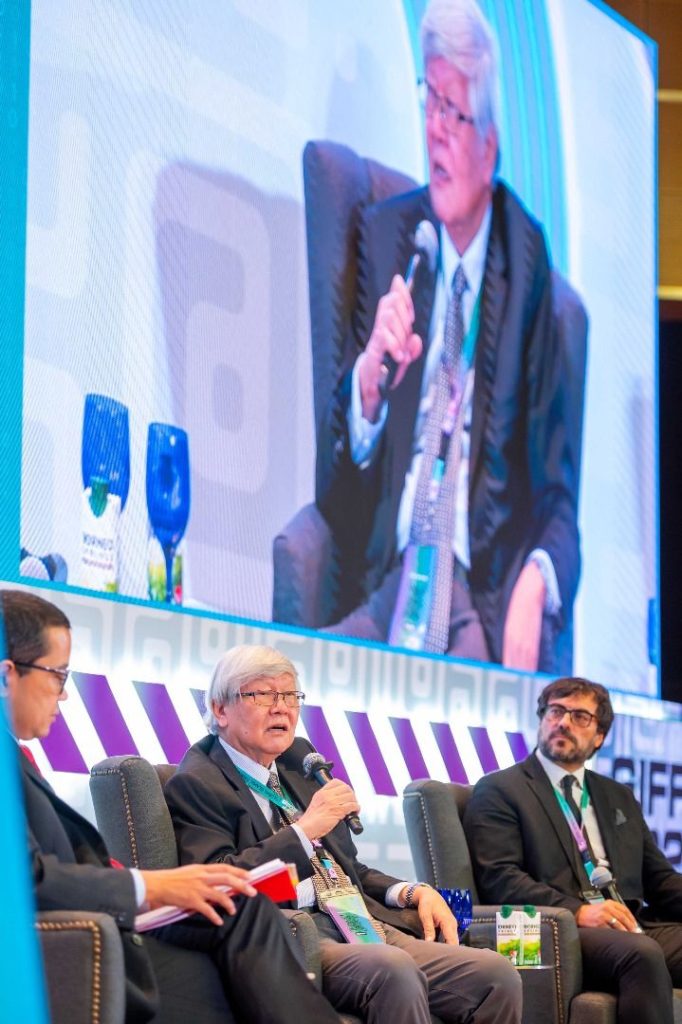Kuala Lumpur (14 October 2025): As global markets navigate geopolitical realignments, technological disruptions and capital flight, thought leaders at the Global Islamic Finance Forum (GIFF) 2025 called for a decisive rethinking of financial models to ensure resilience and equity across Islamic economies.
The session, titled “Navigating Global Shifts: Investment Strategies for Islamic Economies,” featured an impassioned address by Tan Sri Andrew Sheng, MIFC Leadership Council member, alongside investor insights from Ruggiero Lomonaco, Head of Real Estate Funds, Rasmala Investment Bank and moderation by Ahmad Shahriman Mohd Shariff, CEO of CIMB Islamic Bank Berhad and AIBIM Vice President.
Sheng delivered a stirring critique of Western finance and a call to rediscover Islamic finance’s moral and structural foundations. Citing his own slides, he noted that global financial assets now total five times the world’s GDP, underscoring how debt-driven growth has become detached from real value creation.
“The only thing that can deliver a cleaner, fairer world is equity, not debt,” he said, arguing that Islamic finance’s risk-sharing and zakat principles offer a path toward a more sustainable and just economic system.
He contrasted the speculative logic of conventional credit systems with Islamic finance’s emphasis on tangible assets, stewardship and community benefit. “Conventional finance delivers social inequality — it borrows from the future to consume today,” Sheng observed.
He urged policymakers and investors to embrace blended finance models that combine zakat, takaful and equity-based funding to nurture small enterprises and community ventures, rather than perpetuating capital concentration among elites.
“We must have confidence in our own model, not copy the West,” he added.
Ahmad Shahriman highlighted the relevance of Sheng’s framework to Malaysia’s evolving Islamic finance ecosystem. He pointed to initiatives such as iTEKAD and micro-entrepreneurship programmes that blend grants, equity and training as early examples of the circular, impact-driven finance model Sheng envisioned.
He noted the disparity between global capital flows and regional needs: while Southeast Asia requires USD705 billion to develop an integrated power grid benefiting 700 million people, OpenAI recently invested USD1 trillion in AI chips — a reminder of global imbalances in resource allocation.
From an investor’s perspective, Ruggiero Lomonaco shared data from his presentation showing that 82% of global fund allocations remain concentrated in the United States, while Islamic emerging markets attract minimal flows.
Yet, he argued, the Middle East and Asia now present compelling opportunities. “Investors are realising it’s not just about return on investment — it’s about return of capital,” he said.
His slides showed that Gulf markets, led by Saudi Arabia, are reinvesting domestically in infrastructure, social assets and digital transformation, shifting from exporting capital to building internal strength.
Concluding the discussion, Sheng urged the Islamic finance community to reject intellectual dependence on Western frameworks. “Don’t be reactive. Be proactive. Create our own model,” he said. “The old order is collapsing — we must find confidence in our values to build the new.”
